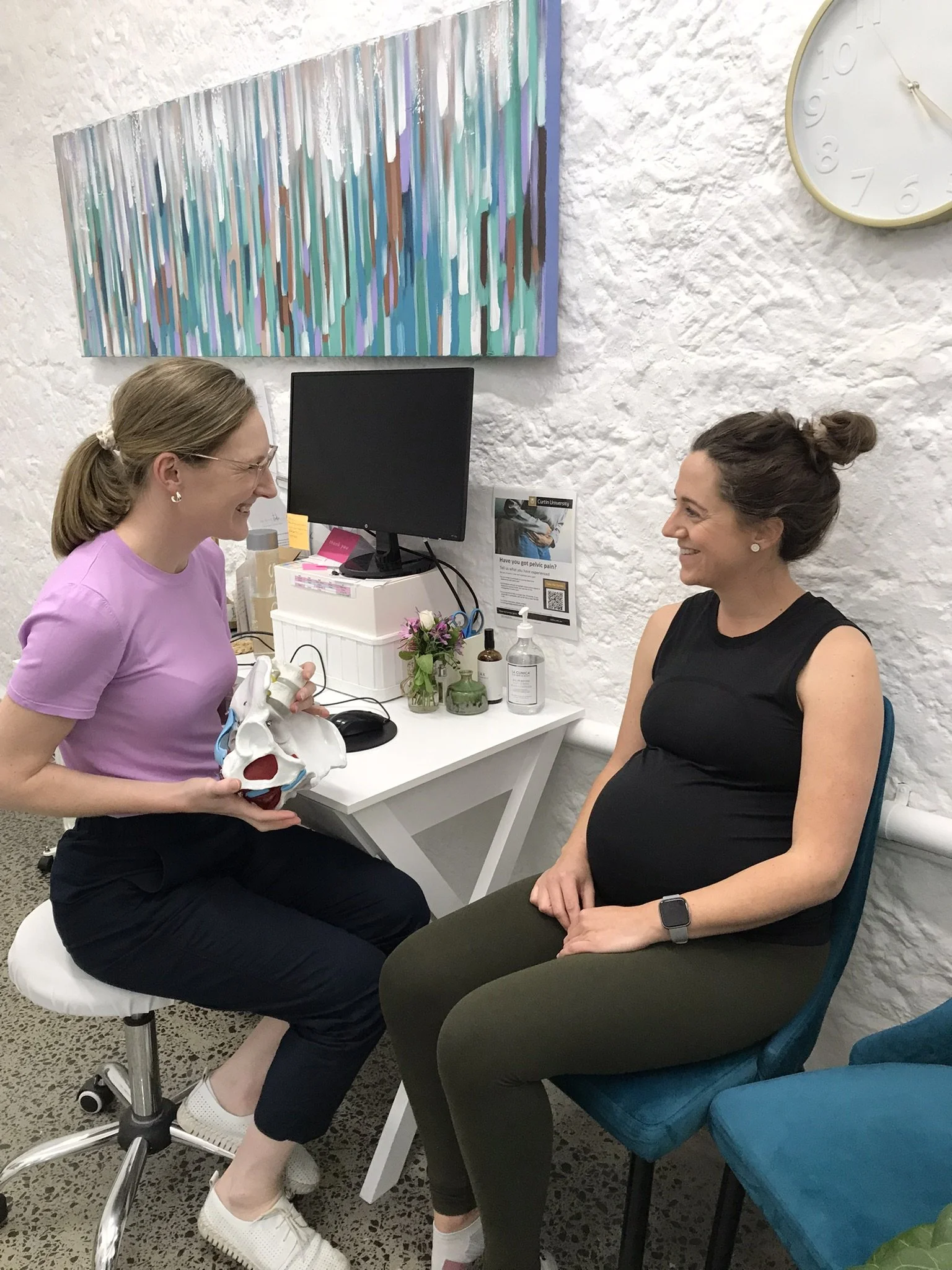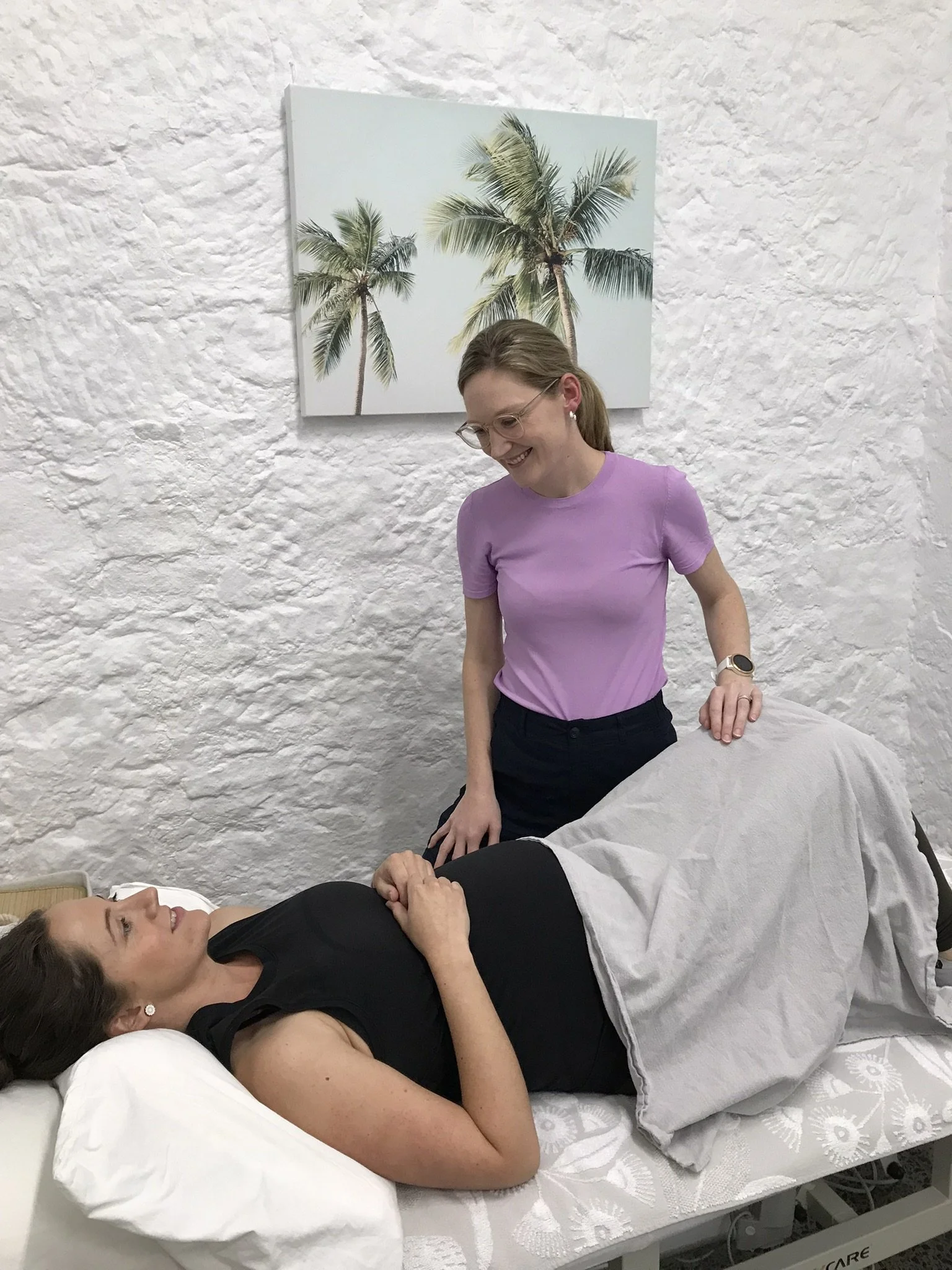Evidence Based Tips For Pregnancy
Evidence Based Tips For Pregnancy
By Hannah Richardson
At The Pelvic Studio we are all about evidence-based practice, and the evidence tells us that pelvic floor physiotherapy can significantly reduce the impact of pregnancy on the pelvic floor. Here are Hannah’s top evidence-based tips for preventing birth trauma, pelvic floor dysfunction and prepare your body for the postnatal period.
Pelvic Floor Muscle Training can improve incontinence
In pregnancy, the pelvic floor can loose strength due to the stretch and strain placed on these tissues as your baby grows, for some women this can result in incontinence. The good news is that there is high level evidence to show that regular and individualised pelvic floor muscle training (PFMT) can improve incontinence. Having a strong pelvic floor contraction throughout your pregnancy will help prevent or lessen the strain to your pelvic floor muscles.
Approximately only 25% of women complete regular PFMT throughout their pregnancy (Johannessen et al., 2020). At TPS we want to change this statistic!!!
What is PFMT?
PMFT is regular exercise, for your pelvic floor!
Your pelvic floor muscles are like any other muscles in your body and need to be placed under load to get stronger. To ensure you know how to correctly contract your pelvic floor muscles book in to see one of our friendly pelvic health physios.
Regular and safe exercise during pregnancy will help to keep a healthy BMI during pregnancy and lower the risk of gestational diabetes.
Both gestational diabetes and a high BMI can lead to having larger babies which puts greater pressure on our pelvic floor muscles during pregnancy and birth.
What is BMI?
This is a measure using your height and weight to determine whether you are in a healthy weight range. During pregnancy weight gain is normal but excessive weight gain isn’t safe for you or bub.
How much exercise should you do whilst pregnant?
Exercise will be dependent on your pre-pregnancy level of fitness, energy levels and medical status. Pregnancy exercise guidelines recommend around 150-300 minutes of moderate aerobic exercise per week and aim to do muscle strengthening exercises 2 days per week. During pregnancy you should measure your intensity by thinking about the “talk test”, this means you should be able to hold a comfortable conversation whilst exercising. If you are looking to start exercising during your pregnancy, we recommend you seek medical advice before starting anything new.
The Pelvic Studio offer Pregnancy Exercise classes which are a safe and supervised environment to exercise in. These classes include functional strength training, Pilates style exercises, reformer exercises, stretching and mobility work.
For more information on our classes, 1:1, 2:1 or 4:1 exercise rehab sessions, click here.
Perineal massage has been associated with lower risk of severe perineal trauma and postpartum complications with vaginal deliveries for first time mothers (Abdelhakin et al., 2020).
What is perineal massage? It’s a method used to help prepare your pelvic floor tissues for birth by allowing the tissues to become more flexible and practice relaxing your pelvic floor muscles when pressure and stretch is applied. Your perineum is the region between your vaginal canal and anus and this area stretches to allow your baby to be born. We encourage a “Labour Prep” appointment at approximately 34-36 weeks to go through perineal massage under the guidance of a pelvic floor physiotherapist. You can find out more about this appointment on our Labour Prep blog here.
Pelvic floor physiotherapy is well regarded as a component of gold standard care in pregnancy.
At The Pelvic Studio our aim is to try and prevent the common issues that occur during pregnancy and beyond, with evidence based therapy. We are also experts in treating issues should they arise, including incontinence, pelvic girdle pain and prolapse.
To find out more in regards to pelvic physiotherapy prenatal care click here, or email our friendly team with any questions.
This blog is courtesy of the following resources:
Effects of Exercise during Pregnancy on Pediatric Heart Measures. (2014). Journal of Cardiobiology, pp.01–05.
Johannessen, H., Frøshaug, B., Lysåker, P., Salvesen, K., Lukasse, M., Mørkved, S. and Stafne, S., 2020. Regular antenatal exercise including pelvic floor muscle training reduces urinary incontinence 3 months postpartum—Follow up of a randomized controlled trial. Acta Obstetricia et Gynecologica Scandinavica, 100(2), pp.294-301.
Abdelhakin, A.M., Eldesouky, E., Elmagd, I.A., Mohammed, A., Farag, E.A., Mohammed, A.E., Hamam, K.M., Hussein, A.S., Ali, A.S., Keshta, N.H.A., Hamza, M., Samy, A. and Abdel-Latif, A.A. (2020). Antenatal perineal massage benefits in reducing perineal trauma and postpartum morbidities: a systematic review and meta-analysis of randomized controlled trials. International Urogynecology Journal.




